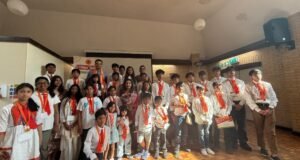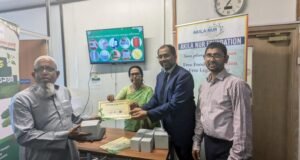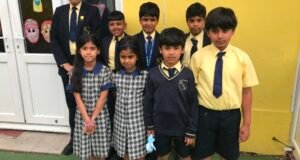
Jasmin Chowdhury:
One of the most eminent Bengali writer, journalist, columnist, political analyst, poet and lyricist will remain in the hearts of every pro-liberation Bengalis forever through the lyrics of ‘Amar bhaiyer rokte rangano.’
Abdul Gaffar Choudhury, who died aged 87, was a veteran journalist who had received several prestigious awards, including the Bangla Academy Literary Award in 1967, Ekushey Padak, UNESCO Literary Award, Bangabandhu Award, Sanghati Lifetime Achievement Award in 2008, Swadhinata Padak in 2009. In the same year, The Daily Ittefaq also honoured him with Manik Miah Padak. In 2014, he was awarded the PIB-Sohel Samad Memorial Award.

Born in Ulania village in Mehendiganj of Barisal on December 12, 1934, he was the son of Zohra Khatun and Haji Wahed Reza Choudhury, a freedom fighter of British India.
He graduated from Dhaka University in 1959 and migrated to the UK in 1974 for the treatment of his wife. After the assassination of Bangabandhu Sheikh Mujibur Rahman, the prospect of returning to Bangladesh looked bleak. Having lost his wife, Selima Choudhury, in 2012, Abdul Gaffar Choudhury tragically lost one of his daughters Binita just a month before his death in London. Binita was the third among his four daughters and a son.

Prior to migrating to the UK, Abdul Gaffar Choudhury worked as a journalist in different national newspapers in Dhaka. During the 1971 Bangladesh’s Liberation War, he worked for Joy Bangla, Jugantar and Anandabazar Patrika.
In the early days after moving to the UK, he worked in various places, including a grocery store, BBC Bengali service as an outside contributor in 1984/1985, and as an interpreter at an immigration tribunal.
Following the assassination of Bangabandhu in 1975, he published a weekly newspaper, ‘Banglar Dak’, to demand justice, and counter misinformation & propaganda while promulgating Bangabandhu’s ideal. At the same time also worked for some time in the progressive weekly Jagaran newspaper. In 1987, he published the newspaper ‘Notun Din’ campaigning against autocratic rule. Then in 1990, he brought out ‘Notun Desh’ and in 1991 ‘Purbo Desh’.

Abdul Gaffar Choudhury regularly wrote in the major newspapers on politics, contemporary events, and international affairs. He wrote a column in the weekly Janomot titled ‘Dhire Bahe Buriganga’. It was a very popular column. He stopped writing for a while. In 1990 he started writing a new column, ‘Tritio moth’. He also wrote a column titled ‘Jibon Theke Neya.’ His writings were so popular that if they were not published, readers would call and ask for an explanation of why his column was not published. One of the reasons for the popularity of Janomot was Abdul Gaffar Choudhury’s column.
He also wrote and produced several plays, including Sodgoti, Nobab Uddin’s ‘New Home’ staged at Logan Hall, London in 1997, Queen Elizabeth Hall, Oldham, and Aston University in Birmingham. Gaffar Choudhury wrote the script for other Nobab Uddin’s plays, including Anal, Bhalobasha chai, Marichika and Saira. Some of the other prominent plays by Abdul Gaffar Choudhury include one on the assassination of Bangabandhu Sheikh Mujibur Rahman, Polashi Theke Dhanmondi, and 21 August, Ekti Rokto Gulap and Ershad Mariamer kechcha against military rule.

Abdul Gaffar Choudhury was also very much involved with the UK Bengali diaspora. He taught children to learn Bangla in a community school. He was involved with BENTH (Bangladeshis Educational Needs in Tower Hamlets), an organisation set up to improve the educational achievements of the community. He was advisor and patron to numerous cultural, social and political organisations, including the Nirmul Committee. He was awarded the Freedom of London Borough of Tower Hamlets. In 1999 Tower Hamlets granted him the Honorary Freeman for his exceptional contribution to the borough. Abdul Gaffar Choudhury was also a lifelong member of the London Bangla Press Club. He was an award winner of the 2010 British Bangladeshi Who’s Who. In addition, the British Bangladeshi Power & Inspiration listed him under media.
Uncompromising with the principles that steered the independence war for Bangladesh and the leadership of Bangabandhu Sheikh Mujibur Rahman, Abdul Gaffar Choudhury was a pioneering writer and political analyst for progressive and secular movements. From seeking justice for victims of war crimes, the brutal killing of the father of the nation and many of his family members in 1975, to protest the rise and spread of violence led by the anti-liberation movement, religious extremists in Bangladesh, Abdul Gaffar Chowdhury has been eminent.
He has presided over many movements, events and think-tanks throughout his life in support of creating a secular Bangladesh. For the last five decades in the UK, Abdul Gaffar Choudhury was instrumental in promoting Bengali literature, history and cultural heritage in different parts of the world. His activities and writing will continue to be a vital source of support and inspiration for all progressive Bengalis.
Renowned for writing the lyrics to “Amar Bhaier Rokte Rangano”, which impeccably articulated the sense of loss, injustices and the national sentiments of Bengalis, recognised as the most influential song of the Bengali Language Movement. Music for the song was later composed and adapted by Altaf Mahmud. Deeply rooted in the hearts of Bengali, listeners of BBC Bengali Service have regarded this song as the third best song in Bengali. Some of his notable works are “Danpite Shawkat”, “Chandrodwiper Upakhyan”, “Nam Na Jana Bhore”, “Nil Jamuna”, “Shesh Rajanir Chand”, “Polashi Thekey Dhanmondi” and “Bastobotar Nirikhey”.
Abdul Gaffar Choudhury, suffering from diabetes and kidney disease, breathed his last at Barnet Hospital in London due to cardiac arrest on 19th May 2022.
Abdul Gaffar Choudhury has left behind his son Anupom Reza Choudhury, daughters Tanima Choudhury-Fieret, Chinmoyee Choudhury and Indira Choudhury. Unfortunately, his youngest daughter Binita Afroze Choudhury died on the 13th of April, a month before he passed away.
(The above article was compiled by Jasmin Chowdhury on behalf UK Nirmul Committee. Abdul Gaffar Chowdhury was an active supporter and an advisor to the UK Nirmul Committee)
 Weekly Bangla Mirror | Bangla Mirror, Bangladeshi news in UK, bangla mirror news
Weekly Bangla Mirror | Bangla Mirror, Bangladeshi news in UK, bangla mirror news







